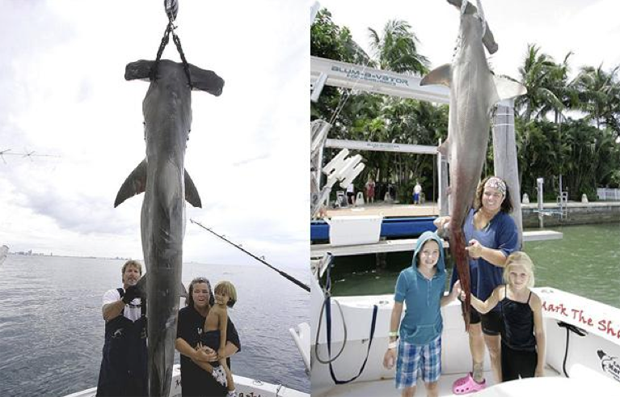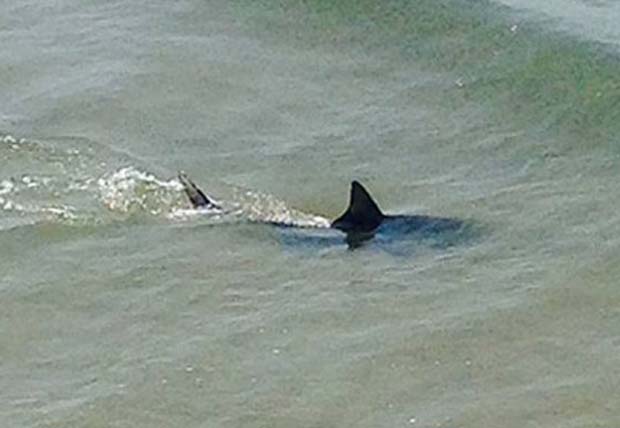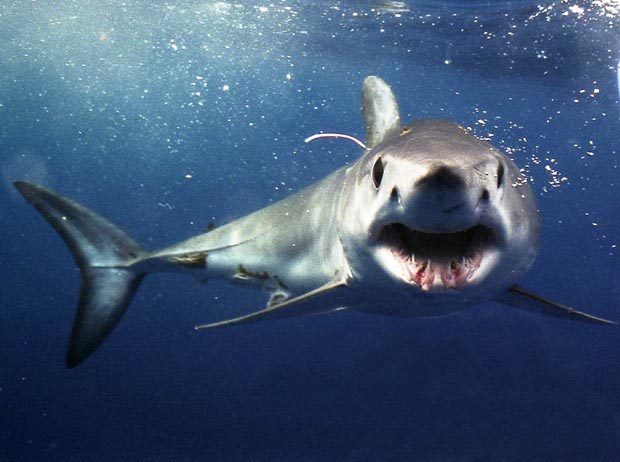 The Misunderstood Shark. A spate of shark attacks this summer has left beach-goers especially fearful, but there’s much more to the creatures than their bite
The Misunderstood Shark. A spate of shark attacks this summer has left beach-goers especially fearful, but there’s much more to the creatures than their bite
Mark Quartiano, a charter captain from Miami, self dubbed “Mark the Shark,” is a dangerous and clown-like character that embraces all that is repugnant in South Florida’s tourist-based charter-fishing industry. He has, by admission, killed thousands of sharks, all of which get thrown in the dumpster post photo ops at the dock – like the one below.

Extreme left, Mark Quartiano with illegally caught and killed endangered hammerhead shark. The shark was caught by tendentious Rosie O’Donnell who is teaching her adopted kids to get it all wrong from the beginning.
By Gregory Skomal / Aug. 7, 2015
[dropcap]O[/dropcap]n Aug. 7, 1954, an almost 14-foot-long great white shark swam into a small harbor on Cuttyhunk Island, just west of Martha’s Vineyard off the coast of Massachusetts. Within hours, two fishing guides from the island had harpooned and killed the potential menace.
Almost exactly 50 years later, in September 2004, another great white shark appeared in the same area, near the neighboring island of Naushon. The reaction this time was very different: At considerable expense, the shark was ushered back to sea (an effort in which I took an active role) because the public demanded that it be saved.
More recently, in mid-July, the Massachusetts Division of Marine Fisheries (where I am a biologist) rescued a juvenile great white shark that was stranded on the beach in Chatham on Cape Cod. The video of the effort went viral, and the scientists were hailed as heroes.
The rescue of a great white shark on Cape Cod.
Our attitude toward sharks has changed over the decades—but not as much as it needs to. Shark attacks still rattle people to the core. The recent spate of them in North Carolina, involving eight victims over 24 days, was particularly disturbing because there were so many of them, in such shallow water, in a short time. Then there was the widely covered episode in July in South Africa, when champion surfer Mick Fanning fended off a shark that seemed hellbent on biting him. (He punched it and escaped.) Throw in the 40th anniversary this summer of the release of “Jaws” and the release of Syfy’s “Sharknado 3,” and it’s easy to see why some people might collapse into a fetal position at the mere mention of “shark.”
Australian surfer Mick Fanning was attacked by a shark during the World Surfing League’s J-Bay competition in South Africa. Photo:
Viewers and readers can’t resist the stories: Sharks sell, but shark attacks really sell. And it’s perfectly rational to fear wild animals with big teeth that maim unsuspecting vacationers.
But people seem to be realizing, if slowly, that there’s much more to sharks than their occasional attacks on humans. In my own work, I have found that the more people know about these extraordinary creatures, the less likely they are to fear them.
And we now understand sharks as never before, having added enormously over the past two decades to our knowledge of their biology, ecology and natural history. With the scientific tools available to us today, we can follow sharks all over the globe to see where they go, what they do and how they do it. This is good for sharks—and for the rest of us, because without them, the oceans could be in trouble.
We know that the chances of getting bitten by a shark are small. Between 1959 and 2010, 18.7 people a year, on average, were bitten by sharks in the U.S., and 0.5 people a year died from an attack, according to the International Shark Attack File, run by the Florida Museum of Natural History. By comparison, 37.9 people a year died of lightning strikes in coastal U.S. states in the same period.
Shark attacks are on the rise, though. Last year, 52 people were attacked by sharks in the U.S., none of them fatally. World-wide, shark attacks have gone from just under 500 in the 1990s to almost 700 in the 2000s. In the 2000s, less than 10% of those attacks were fatal.
The increase in attacks is driven in large part by the simple fact that the population has grown and more people are going into the water each year. In Florida alone, beach attendance has grown from about 11.5 million in 1994 to almost 13 million in 2000, according to the International Shark Attack File.
About Dr. Skomal
Dr. Skomal is a senior marine fisheries biologist for the State of Massachusetts and the author of “The Shark Handbook.”








